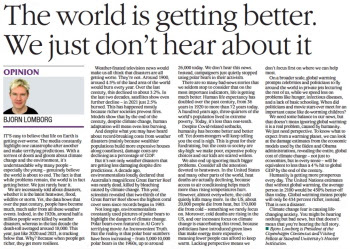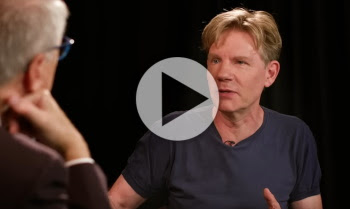Bjorn Lomborg
Let’s focus on the smartest strategies to help the world

|
|
|
|
|
|
|
|
|
|
|
|
|
|
|
|
Bjorn Lomborg
Climate change isn’t causing hunger

From the Fraser Institute
Surprisingly, a green, low-carbon world produces less and more expensive food, and makes over 50 million more people hungry by mid-century.
Food scarcity affects many people around the world. Canada can help, as the world’s fifth largest exporter of agricultural goods and the fourth largest exporter of wheat. Indeed, Canada exports so much food that measured in calories it can feed more than 180 million people.
We hear often that carbon cuts are a priority because climate change is causing world hunger and that even Canada will be hit by higher prices and less choice. These alarmist claims are far from true, and the recommended policies are counterproductive.
Over the past century, hunger has dramatically declined. In 1928, the League of Nations estimated that more than two-thirds of humanity lived in a constant state of hunger. By 1970, malnutrition afflicted just one-quarter of all people. Since 2008, the world has seen less than one-in-ten of all people go hungry, although Covid and Russia’s invasion of Ukraine have increased the percentage from a low of just over 7 per cent to 9 per cent in 2023.
This positive trend is because humanity has become much better at producing food, and incomes have risen dramatically. For instance, we have more than quintupled cereal production since 1926, and more than halved global food prices. At the same time, extreme poverty has dropped precipitously, allowing parents to afford to buy their children more and better food.
There is obviously still more to do, but securing food for the vast majority of the world has been an unmitigated success in the human development story.
As we move towards 2050, it is likely incomes will keep increasing, with extreme poverty almost disappearing. At the same time, food prices will likely slightly decline or stay about the same, as even more people switch to higher-quality and more expensive foods. All credible predictions foresee even lower levels of malnutrition by mid-century.
The impact of climate change on food supply is often portrayed as terrible, but in reality, it means that things will get much better slightly slower. It will change conditions for most farmers, making conditions better for some and worse for others. In total, it is likely the net outcome will be worse, but only slightly so. One peer-reviewed estimate shows the climate impact on agriculture is equivalent to reducing global GDP by the end of the century by less than 0.06 per cent.
CO₂ is a plant fertilizer, as is well-known by enterprising tomato producers, who routinely pump CO₂ into their greenhouses to boost productivity. We see a similar impact across the living world. Since the 1970s, the increasing CO₂ concentration has caused the planet to become greener, producing more biomass. Satellites show that since 2000, the world has gotten so many more green leaves that their total area is larger than the entire area of Australia.
In total, models show that without climate change, the global amount of food, measured in calories, produced in 2050 will likely increase 51 per cent from 2010. Even under extreme, unrealistic climate change, it will increase 49 per cent. Across all models and scenarios, the difference in calories per person is one-tenth of a percent.
The graph shows how many children died each year from malnutrition from 1990 to 2021, with the World Health Organization estimating the impact of climate change up to 2050. Since 1990, the average number of children dying has declined dramatically from 6.5 million to 2.5 million each year. This is an incredible success story.
The WHO expects the decline to continue, with annual deaths halving once again. But in a world with climate change, deaths will still decline but slightly more slowly. Unfortunately, the lower death decline in 2050 created almost all the media headlines from the WHO study, entirely ignoring the dramatic reduction in overall death.
The overarching response from climate campaigners is to demand radical emission cuts to help. But this ignores two important facts. First, trying to affect change through climate policy is the slowest, costliest and least impactful way to help. While even significant climate policy will take over half a century to have any measurable impact and cost hundreds of trillions, it will at best help increase available calories by less than one-tenth of a percentage point. Instead, a focus on increased economic growth is over one hundred times more effective, increasing calorie availability by over 10 per cent. Moreover, it would work in years instead of centuries, and deliver a host of other, obvious benefits.
Second, cutting emissions increases most agricultural costs, like pushing up prices for fertilizer and gas for tractors, along with increased competition for land for biofuels and reforestation. Uselessly, most models just ignore these costs — like the WHO simply imagining a world without climate change. But it turns out that the impact of cutting emissions harms food production much more than climate change does. Surprisingly, a green, low-carbon world produces less and more expensive food, and makes over 50 million more people hungry by mid-century.
While we are being told stories of climate agricultural catastrophes and urged to cut emissions dramatically, the evidence shows that the impact is tiny, making the world improve slightly less fast. The proposed cure is worse than the problem it seeks to fix.
Bjorn Lomborg
Despite what activists say, the planet is not on fire

From the Fraser Institute
Nearly half of young Canadians surveyed in a 2022 study said they believed humanity is doomed because of climate change, while more than three-quarters said they were frightened. No wonder. They have grown up bombarded both by footage of natural disasters, not just in Canada but around the world, and by activists’ claims that climate change is making the planet unliveable. But that’s just wrong.
The ubiquity of phone cameras and our ability to instantly communicate mean — the “CNN effect” — that the media can show more weather disasters now than ever before. But that doesn’t mean the disasters are deadlier or costlier.
As we saw in the first article in this series, deaths from climate-related disasters have dropped precipitously. On average in the 1870s five million people a year died from such disasters. A century ago, about half a million people a year did. In the past decade, however, the death toll worldwide was fewer than 10,000 people a year. As global population has more than quintupled, disaster deaths have declined 500-fold. And this dramatic decline is true for all major disaster categories, including floods, flash floods, cold waves and wind disasters, and for rich and poor countries alike. But you never hear about that during disaster reporting.
Floods are the most costly and frequent Canadian disasters. But the common claim that flood costs are rising dramatically ignores the obvious fact that when a flood plain has many more houses on it than decades ago and the houses are worth much more then the same flood will cause a lot more damage. We need to keep these changes in mind and measure costs in proportion to GDP. Even the UN says that’s how to measure whether cities and towns are safer.
Though peer-reviewed analysis for Canada is lacking there is plenty to draw on elsewhere. As so often, the U.S. has the most comprehensive data. It shows that while flood costs have increased in absolute terms, that’s only because more people and property are in harm’s way. In the country’s worst year for flooding, 1913, damage exceeded two per cent of GDP, though the yearly average in that era was 0.5 per cent. Today it’s less than 0.05 per cent of GDP — just a tenth what it was a century ago.
We know adaptation makes disasters much less threatening over time. Consider sea level rise, which threatens to flood coastal zones around the world. A much-cited study shows that at the turn of this century an average of 3.4 million people a year experienced coastal flooding, with $11 billion in annual damages. At the same time, around $13 billion or 0.05 per cent of global GDP was spent on coastal defences.
By the end of this century, more people will be in harm’s way, and climate change could raise sea levels by as much as a metre. If we don’t improve coastal defences, vast areas will be routinely inundated, flooding 187 million people and causing $55 trillion in annual damages, more than five per cent of global GDP in 2100. This finding does routinely make headlines.
But it ignores adaptation, which research shows will cost much less. On average, countries will avoid flood damage by spending just 0.005 per cent of GDP. Even with higher sea levels, far fewer people will be flooded — by 2100 just 15,000 people a year. Even the combined cost of adaptation and damage will be just 0.008 per cent of GDP.
Enormously ambitious emissions-reduction policies costing hundreds of trillions of dollars could cut the number of people flooded at century’s end from that 15,000 number down to about 10,000 per year. But notice the difference: Adaptation reduces the number currently being flooded by almost 3.4 million and avoids another 184 million people being flooded annually by 2100. At best, climate policy can save just 0.005 million.
We often hear that the “world is on fire” because of climate change. New Liberal leader Mark Carney repeated that in his acceptance speech Sunday. And it’s true that in 2023 more of Canada’s surface area burned than in any year since 1970, with climate change probably partly to blame. Even so, two points need to be kept in mind.
First, most studies projecting an increase in wildfires ignore adaptation. In fact, humans don’t like fire and make great efforts to reduce it, which is why since 1900 humanity has seen less burned area, not more. The data from last century involve historical reconstruction but since 1997, NASA satellites have tracked all significant fires. The record shows a dramatic fall in global burned area. Last year it was the second lowest, and in 2022 the lowest ever. And studies find that with adaptation the area burned will keep falling, even without climate action.
Second, reducing emissions is a terribly inefficient way to help. Studies by the U.S. Environmental Protection Agency show that even drastic cuts in emissions would reduce the burned area only slightly this century. Simpler, cheaper, faster policies like better forest management, prescribed fires and cleaning out undergrowth can help much more.
The flood of disaster porn is terrifying our kids and skewing our perception, and that can only lead to bad climate policy.
-

 2025 Federal Election2 days ago
2025 Federal Election2 days ago2025 Election Interference – CCP Bounty on Conservative Candidate – Carney Says Nothing
-

 2025 Federal Election2 days ago
2025 Federal Election2 days agoPoilievre on 2025 Election Interference – Carney sill hasn’t fired Liberal MP in Chinese election interference scandal
-

 2025 Federal Election1 day ago
2025 Federal Election1 day agoJoe Tay Says He Contacted RCMP for Protection, Demands Carney Fire MP Over “Bounty” Remark
-

 2025 Federal Election1 day ago
2025 Federal Election1 day agoHong Kong-Canadian Groups Demand PM Carney Drop Liberal Candidate Over “Bounty” Remark Supporting CCP Repression
-

 Censorship Industrial Complex2 days ago
Censorship Industrial Complex2 days agoWelcome to Britain, Where Critical WhatsApp Messages Are a Police Matter
-

 2025 Federal Election1 day ago
2025 Federal Election1 day agoAlcohol tax and MP pay hike tomorrow (April 1)
-

 2025 Federal Election1 day ago
2025 Federal Election1 day agoPoilievre To Create ‘Canada First’ National Energy Corridor
-

 2025 Federal Election24 hours ago
2025 Federal Election24 hours agoChina Election Interference – Parties Received Security Briefing Days Ago as SITE Monitors Threats to Conservative Candidate Joe Tay
















